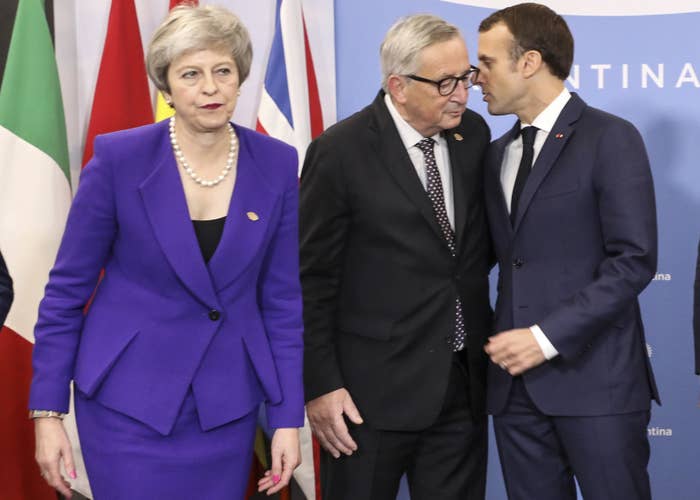
The European Union has made clear that the Brexit ball is now firmly in the UK’s court after Theresa May suffered the worst defeat in House of Commons history, officials have said.
A senior EU official told BuzzFeed News on Wednesday morning: “The 27 will not move at all without some very precise clarity from May.”
Her withdrawal agreement was opposed by 432 votes to 202 on Tuesday, a historic margin of 230.
In a statement released after the result, European Commission president Jean-Claude Juncker said that the EU will work to ratify Theresa May's deal regardless, and urged the UK to "clarify its intentions as soon as possible".
"On the EU side, the process of ratification of the Withdrawal Agreement continues," he said.
"The Withdrawal Agreement is a fair compromise and the best possible deal. It reduces the damage caused by Brexit for citizens and businesses across Europe. It is the only way to ensure an orderly withdrawal of the United Kingdom from the European Union."
He added that the EU is preparing for the increased risk of a no-deal Brexit.
"The risk of a disorderly withdrawal of the United Kingdom has increased with this evening's vote. While we do not want this to happen, the European Commission will continue its contingency work to help ensure the EU is fully prepared."
Juncker ended the statement with the words: "Time is almost up."
The EU's chief negotiator Michel Barnier confirmed this position on Wednesday morning, telling the European Parliament: "Whatever happens, ratification of the withdrawal agreement is necessary. It is a precondition."
Tuesday's historic defeat left the EU "fearing more than ever that there is a risk" of a no-deal Brexit, he said, and the bloc is ramping up preparations for such an eventuality.
He added the EU will discuss an alternative deal if the UK changes its "red lines".
European Council president Donald Tusk suggested in a cryptic tweet on Tuesday night that the UK should stay in the EU.
If a deal is impossible, and no one wants no deal, then who will finally have the courage to say what the only positive solution is?
The EU has indicated that any request would need to come from the UK – “setting out the reasons for such an extension, it will be a matter for the EU27 to decide by unanimity.”
Officials have previously told BuzzFeed News that any such reasons could include, a few weeks or months to complete ratification, the time needed to hold a general election or a referendum, or following a significant shift in the UK’s red lines.
An extension beyond July when the new European parliament sits would be less straightforward as it would most probably require the UK to participate in May’s EU elections.
However, it wouldn’t be impossible, some officials say. Asked about the possibility of extending article 50, a senior European government official said: “An extension would not be an issue”.
Sources told BuzzFeed News before the so-called meaningful vote that the EU's remaining states would make clear they would not change their position if the deal were rejected.
“[The 27] will say that the ball is now exclusively in the UK’s court,” one source said.
Ahead of the so-called meaningful vote in the House of Commons, there was speculation in the British media that the EU could soften its position in the event of a defeat for May to boost her chances of bringing the deal back to parliament a second time and winning the support of rebel MPs.
The Sun reported on Tuesday morning that May was even hopeful that German chancellor Angela Merkel had offered to help win new concessions from Brussels, including agreeing to an end date for the so-called backstop, an insurance policy to ensure there can be no hard border in Northern Ireland in any scenario.
But the German government quickly shot down the story. A spokesperson told reporters: “The Chancellor has made no further assurances than the ones already made by the European Council in December and those agreed upon by Jean-Claude Juncker and Donald Tusk in their letter.”

